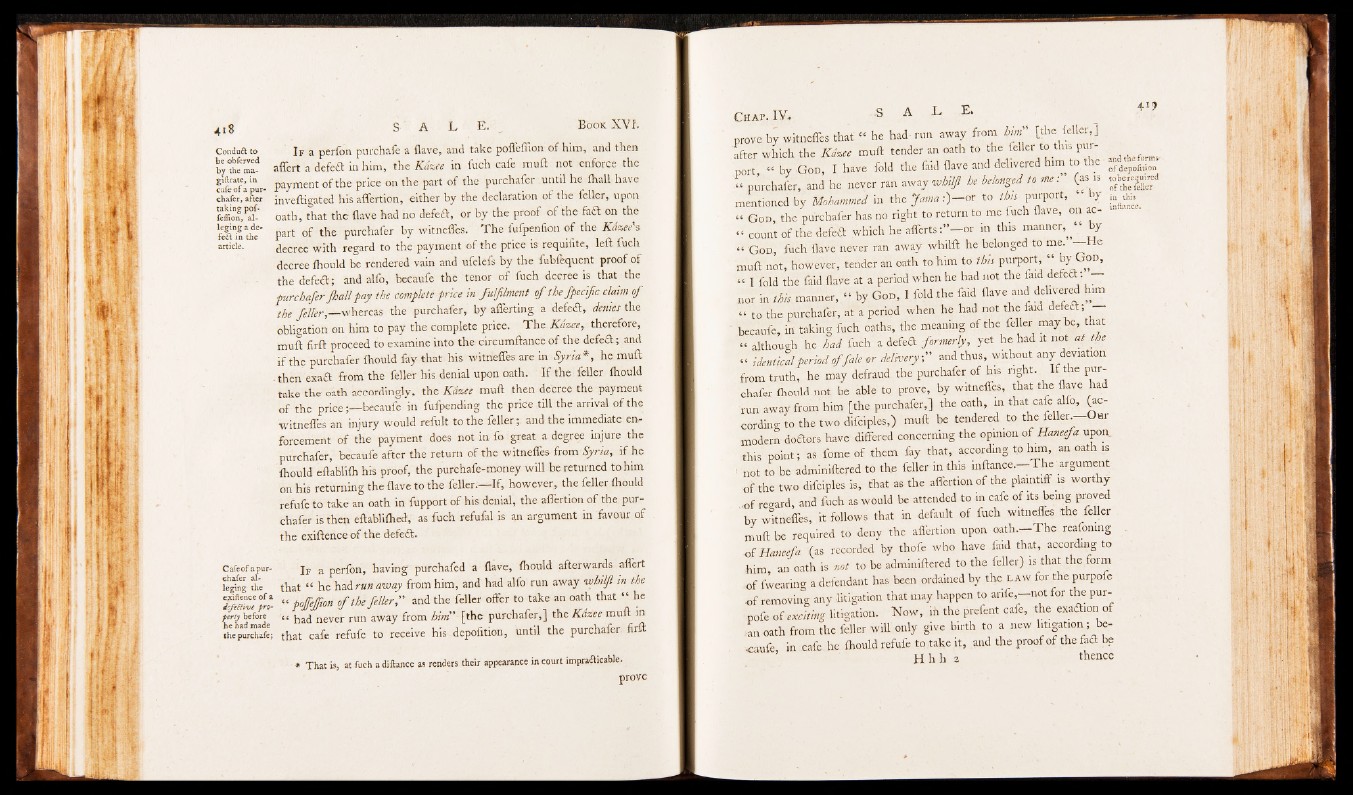
Condnft to Jp a perfon purchafc a {lave, and take pofleflion of him, and then
by tema- affert a defea in him, the Kdzce in fuch cafe muft not enforce the
giftrate, in payment Gf the price on the part of the purchafer .until he {hall have
chafer, after inve:ftiorated his aflertion, either by the declaration of the leHer, upon
reffio„g,Paf oath, that the flave had no defect, or by the proof of the faft on the
fc!t”i!ufe' part of the purchafer by witneffes. The fufpenfion of the Kdzee's
article. decree with regard to the payment of the price is requifite, left fuch
decree fhould be rendered vain and ufelefs by the fubfequent proof of
the defea,- and alfo, beeaufe the tenor of fuch decree is that the
purchafer Jhall pay the complete price in fulfilment o f the fpecfic claim of
the feller,— whereas the purchafer, by afferting a defea, denies the
obligation on him to pay the complete price. The Kdzce, therefore,
muft firft proceed to examine into the circumftance of the defea; and
if the purchafer fhould fay that his witneffes are in Syria * , he muft
• then exaft from the feller his denial upon oath. If the feller fhould
take the oath accordingly, the Kdzee muft then decree the payment
of the price;— beeaufe in fufpending the price till the arrival of the
witneffes an injury would refult to the feller;; and the immediate enforcement
of the payment does not in fo great a degree injure the
purchafer, beeaufe after the return of the witneffes from Syria, if he
fhould eftaBlilh his proof, the purchafe-money will be returned to him
on his returning the flave to the feller.— If, however, the feller {hould
refufe to take an oath in fupport of his denial, the affertion of the purchafer
is then eftablifhed, as fuch refufal is an argument in favour of
the exiftence of the defedt.
Cafe o f a pur- j F a perfon, having purchafed a flave, fhould afterwards affert
k gin g the that “ he had run away from him, and had alfo run away whiljl in the
"itm T tr l “ M M o f the feller f and the feller offer to take an oath that “ he
ferty before ^ad never run away from hirri| [the purchafer,] the Kazee muft in
the^purchafe; that cafe refufe to receive his depofition, until the purchafer- firft
* That is, at fuch a diftance as renders their appearance in court impra£hcable.
prove
C h a p . IV. •S A L E.
41?
prove by witneffes that I he had-run away from hiin" [the feller,]
after which the Kdzce muft tender an oath to the feller to this purport
“ by -God, I have fold the fa-id flave and delivered him to the H B K 2 |
“ purchafer, and he never ran away whiljl he belonged to M M W S W
mentioned by Mohammed in the Jama:)— or to puiport, y | | § g
I G od, the purchafer has no right to return to me fuch flave, on acc
o u n t of the defe'ft which he af f er t sor in this manner,^4 by
“ God, fuch flave never ran away whilft he belonged to me. — He
muft not, however, tender an oath to him to this purport, g
I I fold the faid flave at a period when he had not the find defea ;
nor in this manner, “ by G od, 1 fold the faid Have and delivered him
1 to the purchafer, at a period when he had not the faid defea-,
beeaufe, iri taking fuch oaths, the meaning of the feller maybe, that H although he had fuch a defea formerly, yet he had it not at the
I identical period o f fale or .delivery;” and thus, without any deviation
from truth, he may defraud the purchafer of his right. If the pui-
chafer fhould not be able to prove, by witnefles, that the flave had
run away from him [the purchafer,] the oath, 111 that cafe alfo, (according
to the two difciples,) muft be tendered to the fe lle r -O u r
modern doaors have differed concerning the opinion of Haneefa upon,
this point ; as feme of them fay that, according to him, an oath is
1 not to be adminiftered to the feller in this inftance.— The argument
of the two difciples is, that as the affertion of the plaintiff is worthy
.« f regard, and fuch as would be attended to in cafe of its being proved
by witneffes, it follows that in default of fuch witneffes the feller
muft be required to deny the affertion upon o a th .-T h e reafonmg I
« f Haneefa (as recorded by thofe who have-faid that, according to
him an oath is not to be adminiftered to the feller) is that the form
of fwearino- a defendant has been ordained by the l a w for the purpofe
of removing any -litigation that may happen to arife,— not for the purpofe
of exciting '.litigation. Now, 1 the prefent cafe, the M g
an oath from the feller will only give birth to a new litigation; be-
caufe in cafe - he fhould refufe to take it, and the proof of the fad be